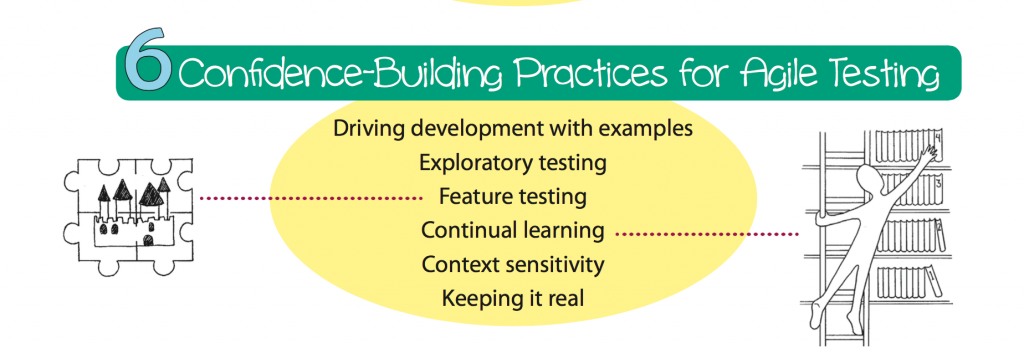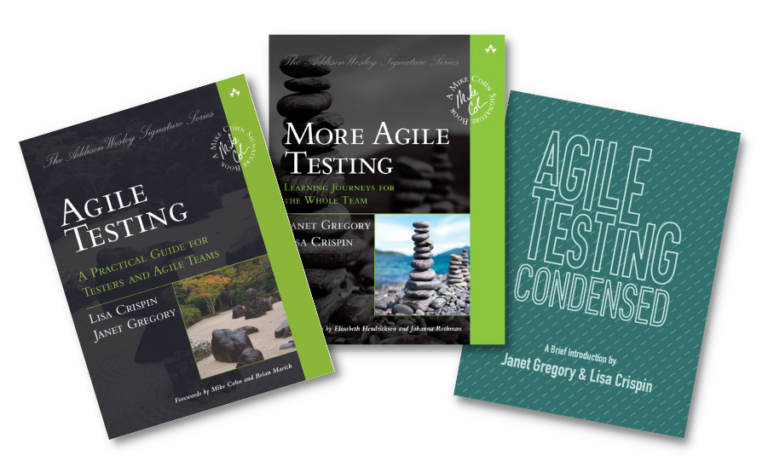I enjoy listening to the “Testing in the Pub” podcasts with Stephen Janaway and Dan Ashby (along with various guests). Though the episodes make me thirsty for a pint of cider, the casual but insightful conversations inspire me to learn and try different ideas. One recent episode was about being a valued team member. I was struck by their observation that one needs confidence to be an effective communicator. If you are confident in your skills and experience, you can go talk to anyone on the team to ask questions, to raise and investigate issues.
That was a real aha moment for me. As testers we talk a lot about learning about our software to gain confidence in what we’re going to deliver. But I hadn’t thought about the value of being confident in yourself. Janet Gregory and I have been presenting conference sessions about whether a tester needs programming skills to be to be useful. Our view is that technical awareness helps testers communicate with programmers because it gives them a shared language. But after hearing the Testing in the Pub podcast, I think that learning some technical skills also builds confidence.
Looking back on my own career, I remember that when I faced a tough challenge, such as learning a new tool, I felt confident that somehow I would succeed. I started out as a programmer/analyst, and though it’s been a long time since I spent a significant amount of my time coding, I feel confident in conversations with programmers. I’ve learned a bunch of difficult domains, so I believe I can learn any new domain quickly. That makes me confident in approaching business experts and learning from them.
Janet and I have six confidence-building practices to succeed with agile testing (see below). What are the confidence-building practices to succeed in adding value as a tester? Just off the top of my head:
- Make time to learn. Set goals, make a personal kanban board or other organizing tool so that you’ll work on them, use pomodoros or some similar technique to pace yourself.
- Public speaking is scary, but builds confidence. Helping others learn means you learn too. Volunteer to share your unique experiences at a local meetup.
- Put a bowl of chocolates on your worktop and invite teammates to come help themselves. It gives you a chance to chat informally and get to know them better.
What ideas do you have for building your own confidence as a tester and team member?



10 comments on “Confidence”
One that has been in my mind recently, not just for testing, but for life in general is – learning to practice, experiment and fail and being ok with the results. Perhaps the key is knowing what to do with the results – whether they are good or bad we can learn from them and become more confident in our skills.
I know in my earlier years I felt the pressure of feeling like I should know stuff when I didn’t 🙂
Emma Armstrong was just talking about taking time for deliberate practice in our Agile 2015 workshop. It’s something I forget to make time for. I like the Code Retreat style of practicing and throwing the outputs away – because it is for practice, it’s not ‘done’.
[…] Confidence – Lisa Crispin – https://lisacrispin.mystagingwebsite.com/2015/08/04/confidence/ […]
[…] Source: lisacrispin.com/2015/08/04/confidence/ […]
Interesting, confidence is definately not underrated, self-doubt is a bad thing, I remember a (sort of) mentor saying to me; the best thing you can do is the right thing, the next best is something but the worst thing you can do is nothing (ps there may be some extreme exceptions!). We learn by doing, feeling, experiencing; certainly that’s how I helped my children learn to swim & ride a bike. James Shore an Agile guru described to me his approach to learning Agile as ‘total immersion’ which i really liked as it harked back to learning to swim. KIS(S) keep it simple is such a powerful expression as we so often overcomplicate something I often do, so i must KISS more often. Thanks Lisa
[…] Source: lisacrispin.com/2015/08/04/confidence […]
Reading test blogs and listening to test podcasts give me confidence for testing. Not necessarily because I gain knowledge, but moreover they often sharpen my own thoughts and acknowledge my gut feeling that I was not certain about before. It gives me the courage to try new practices and (like Rosie said) most of the time feel pretty OK about the result.
[…] goal. An especially compelling interdependency is between agile analysis and agile testing. The six confidence-building practices to succeed with agile testing from Lisa Crispin and Janet Gregory are also valuable for successful agile business […]
[…] goal. An especially compelling interdependency is between agile analysis and agile testing. The six confidence-building practices to succeed with agile testing from Lisa Crispin and Janet Gregory are also valuable for successful agile business […]
[…] Lisa Crispin’s Blog wurden wir dazu inspiriert, unsere eigene Liste an Methoden zur Stärkung des Vertrauens bei agilen […]